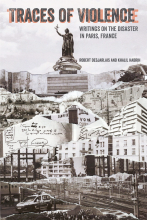Book Talk: Traces of Violence: Reflections on colonial geographies and collaborative ethnography in Paris, France
Tuesday, Nov 8, 2022, 4:30 – 6 p.m.
Communications Building (CMU) 202
Co-sponsors: Comparative History of Ideas, Simpson Center for the Humanities, African Studies, Global Studies, Jackson School of International Studies, French and Italian Studies, Anthropology
In Traces of Violence: Writings on the Disaster in Paris, France, Robert Desjarlais and Khalil Habrih present a dialogic account of the lingering effects of the terroristic attacks that occurred in Paris in November 2015. Situating the events within broader histories of state violence in metropolitan France and its colonial geographies, the authors interweave narrative accounts and photographic images to explore a range of related phenomena: governmental and journalistic discourses on terrorism, the political work of archives, police and military apparatuses of control and anti-terror deterrence, the histories of wounds, and the haunting reverberations of violence in a plurality of lives and deaths. Traces of Violence offers an innovative example of collaborative writing across anthropology and sociology. The writing of the book proceeds in interwoven ways with distinct texts essayed by the two authors working in dialogue with one another, and with some passages serving as “interruptions” to the main texts found in each chapter.
Khalil Habrih is a doctoral candidate in Anthropology at the University of Ottawa, where they study and teach. Khalil Habrih has conducted socio-anthropological research in Paris, France since 2015; an ethnography of police presence in La Goutte d’Or (Paris, 18e) attentive to both the state’s territorialization of “Priority Zones for Security” and the memorialization of state violence by the people who live within such zones. Their current anthropological research attends to questions of erotics and violence in contemporary and colonial urbanism in the 18th arrondissement of Paris.
Robert Desjarlais is an American writer and Professor of Anthropology at Sarah Lawrence College. He has conducted anthropological research in several distinct settings, from the Nepal Himalayas to North America. Significantly, Robert Desjarlais’ work focuses on the formation of subjectivities, and continues to contribute an anthropology grounded in critical phenomenology. Continuing and reformulating the research he has recently undertaken in France, on the aftermath of the 13 November attacks in Paris, Robert Desjarlais’ current work attends to questions of image, violence, and the politics of “life death” in postcolonial France and Algeria.
